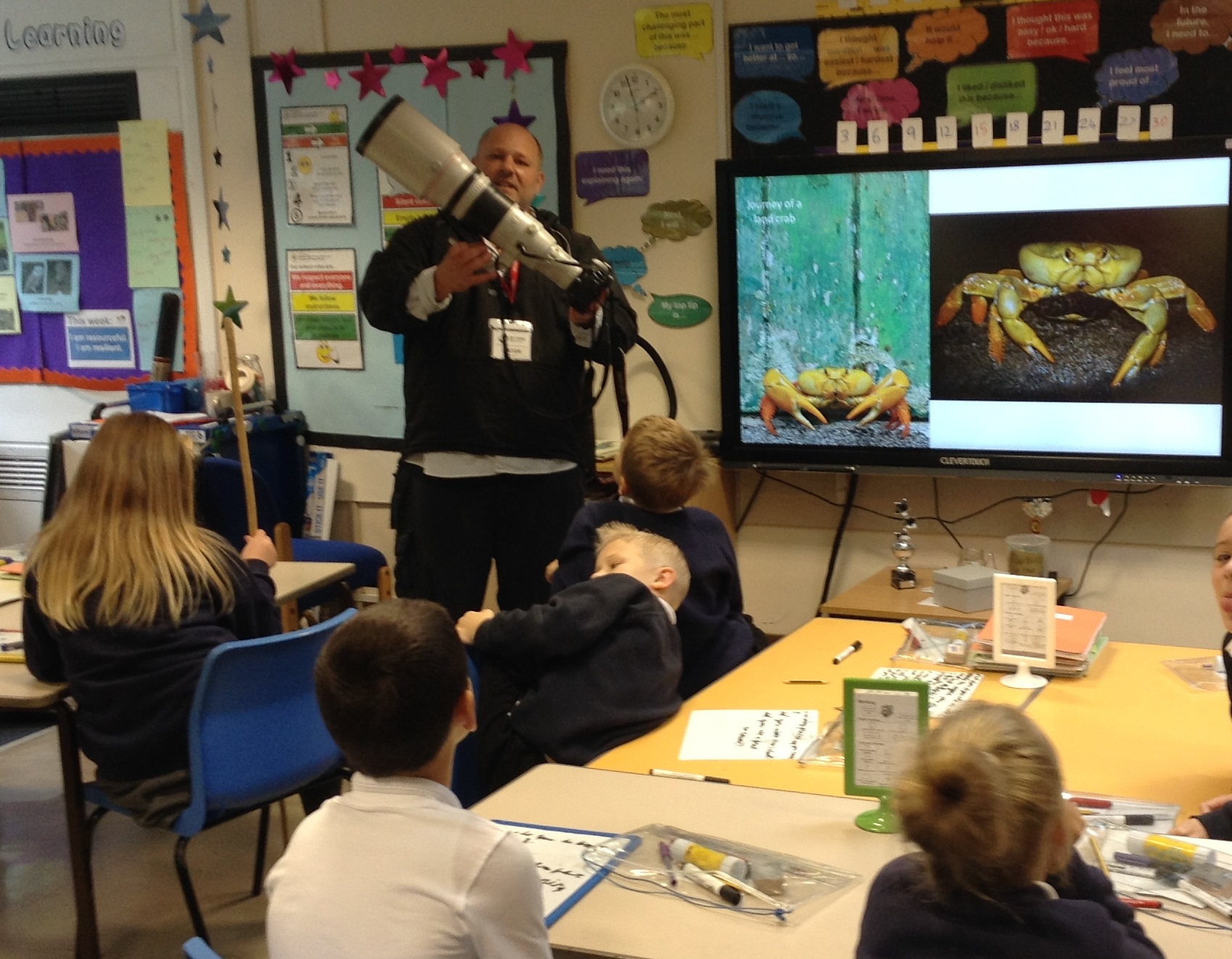Yesterday, you 'watched us while we work'...
Posted on 09 November 2017 by Mr Roundtree
…thanks very much to you if you came along yesterday to the first of our ‘Watch us while we work’ sessions. This was a visit to school to get a flavour of what Reading, Writing and Maths teaching and learning is like in school, and hopefully to help you understand more about your child’s progress and how you can support at home.
Thanks for the feedback, too. Following the visits to classes, you had the opportunity to speak with Miss Hague about what you saw and to raise any questions and comments.
Here’s some of the feedback:
“Excellent to see how the children respond in each class. Year 5,6 was fantastic – hands-on learning, helping each other and talking through problems. Year 3,4 – nice idea using dice to help so calculations. Will use this at home. Year 1,2 – nice to see the children working in groups. Liked the counters to help them.”
“All of it was very good to watch.”
“It was good to see the pride in children as parents watched, and good to see older children taking responsibility for showing children round.”
“The children seemed to be really enjoying the work but also they were challenged. It went really well. Very reassuring.”
“It was good to see what was going on in the classroom and how the children are taught so we can implement this at home.”
That’s great – thanks very much. Teachers will appreciate the comments.
Identity
Posted on 02 November 2017 by Mr Roundtree
Our Living and Learning theme this half-term is Identity. Pupils will learn about their rights and responsibilities, what makes themselves and others special, valuing the similarities and differences between themselves and others and what is meant by community. This will be taught through our Living and Learning sessions and also two focused weeks – Anti-bullying week (13 November) and Who do you think you are? (20 November).
Our full Living and Learning long term plan is now available on the health pages and you can keep up to date with our weekly Living and Learning statements on the parent noticeboard in the playground and also on the school calendar.
Attendance matters
Posted on 30 October 2017 by Mr Roundtree
We’re really happy to see that the first half-term of this school year has seen a really good rise in attendance compared to the same period last year.
- Autumn 1 last year 96.9%
- Autumn 1 this year 97.3%
Obviously, the more days your child is at school, the more days they’re learning, so this improvement is great – well done and thank you to pupils and parents/carers. Let’s keep this up throughout the year!
What about each year group? Well, it’s worth looking at to see just how well most of the years groups are doing. A big well done to pupils (and parents/carers!) in Year 2, 3, 4 and 5 – attendance for these year groups is all above the school average. Year 5 aren’t far behind, either!
- Rec – 96.3%
- Y1 – 93.3%
- Y2 – 99.0%
- Y3 – 98.9%
- Y4 – 98.8%
- Y5 – 97.2%
- Y6 – 98.2%
Governing Body review
Posted on 24 October 2017 by Mr Roundtree
An external review of governance was carried out on Scholes (Elmet) Primary School on 13 March 2017, following a recommendation from the Ofsted inspection in January 2017. There was not exactly the same recommendation from the St James’ inspection in March – this is because the schools share the same Governing Body and the review was already taking place. However, the St James’ inspection recommended: ‘recommendations from the review of governance are used to improve the school’s overall effectiveness to be good’.
A follow-up review was arranged to consider progress since then. This took place on 27 September 2017. A summary of the findings is presented here (with key points added in bold – not part of the original text).
The reviewers found a good deal of evidence to demonstrate rapid development of the effectiveness of the governing body.
The governors who had completed the skills audit evidenced a good representation of essential and specialist skills and experience as described in the DfE’s Competency Framework for Governance and the Ofsted report, December 2016, “Improving Governance”.
There was one vacancy on the governing body for an LA governor due to a recent resignation. The governing body identified that they would benefit from someone with skills and experience in buildings and property management…
The governors’ knowledge of the school showed a marked improvement since the March 2017 audit in a number of areas…
Governors were aware of the importance of self-development and a governor has been assigned responsibility for training. The training governor will consider the completed skills audits alongside allocated responsibilities with a view to mapping out a training and development programme for the year.
This is a great conclusion for the Governing Body review: well done and thank you to our current team of governors. School leaders all report feeling supported but also challenged and held to account by current governors.
Parent/carer drop in sessions
Posted on 19 October 2017 by Mrs Quirk
The EPOSS Cluster supports parents, children and young people from the schools in Wetherby, Boston Spa and surrounding villages. This includes St James’ CE Primary School.
The support offered includes:
• Support managing unwanted or challenging behaviour at home.
• Emotional wellbeing.
• Support for anxious children.
• Support with areas of difficulty such as bedtimes or mealtimes.
• Advice for parents.
• Signposting to other support agencies.
The team are holding a drop-in session on WEDNESDAY 15 NOVEMBER from 1.30pm to 3.15pm at school.
The team contains a range of professionals including outreach workers, an art therapist and a counsellor that work together to identify and provide the most appropriate advice and support for all families.
We look forward to welcoming you!
A visit from a real-life explorer!
Posted on 14 October 2017 by Miss Beatson
This week, we had a visit from David Higgins, a well-known photographer and explorer. He talked to us about his wonderful, exciting adventures from around the world and he had many stories to tell. David showed us a selection of the extraordinary photographs he has taken of animals from across the globe and some of them can be seen on the National Geographic website.

Homework review
Posted on 12 October 2017 by Miss Beatson
Thank you to all the parents who visited school today for our homework review. There has been some fantastic, creative homework produced by the children this week. Our ‘Watch us while work’ morning is taking place on Wednesday 08 November where you can see some more fantastic learning in our classrooms.
Some of the comments from our parents today:
What went well:
- “I think it is a great way to see how every child has individuality and personality. It’s lovely to see all the children proud of their achievements.”
- “I really liked the way all the children had their say and offered advice or ideas to improve.”
An ‘even better if’ comment:
- “All the children get a comment made on their work, even if it’s a teacher’s comment.”


Nell Bank leaf trail - 07 and 08 October
Posted on 24 September 2017 by Mrs Quirk
Nell Bank would like to invite you to their Leaf Trail on Saturday 07 and Sunday 08 October.
They have teamed up with the Ilkley Arts Trail to create a unique and exciting event based in the grounds at Nell Bank.
Over 30 of the artists who are exhibiting through the week of the Art Trail have produced some wonderful pieces of leaf themed artwork especially for this event. The beautiful pieces of art will be positioned around the centre to create an exciting trail that the whole family will be able to enjoy.
As well as the trail, children will be able to take part in some of their favourite Nell Bank activities including the Adventure Playground and Water Play, as well as enjoying the opportunity to explore with their families.
Entry will be £2 per person, with under 5s going free!
There will also be a ‘pop up café’ to provide hot food and hot drinks.
Our very own sporting superstar!
Posted on 22 September 2017 by Miss Beatson

Practice that feels like play
Posted on 21 September 2017 by Mr Roundtree
Practice that feels like play – does this sound beneficial for your child? Have a look at IXL. It’s an online tool where you can access different activities to help your child practise basic skills.
It’s split into year groups, specifically looking at English and Maths, then each subject is broken down into sections. You can get a flavour of the activities by hovering over the title and can have a go at some of them – it looks great fun and very child friendly. The questions are all interactive and there are detailed explanations for new concepts.
There is a small monthly fee if you wish to sign up. Take a look – it might be something you want to explore.